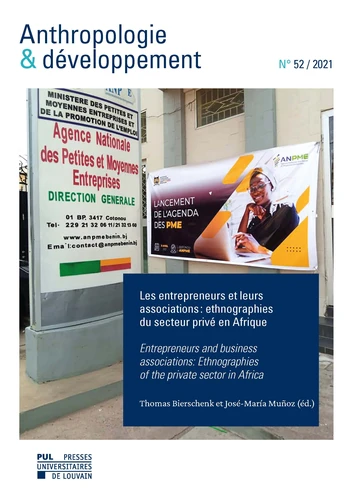Anthropologie & développement n° 52, 2021. Dossier – Les entrepreneurs et leurs associations : ethnographies du secteur privé en Afrique
Par : ,Formats :
- Paiement en ligne :
- Livraison à domicile ou en point Mondial Relay indisponible
- Retrait Click and Collect en magasin gratuit
- Réservation en ligne avec paiement en magasin :
- Indisponible pour réserver et payer en magasin
- Nombre de pages240
- PrésentationBroché
- Poids0.412 kg
- Dimensions17,0 cm × 24,0 cm × 0,0 cm
- ISBN978-2-39061-188-2
- EAN9782390611882
- Date de parution04/08/2022
- CollectionRevue Anthropologie & Développ
- ÉditeurPresses Universitaires Louvain
Résumé
Twenty years after The Economist called Africa "the hopeless continent" (13 May 2000), the view has profoundly changed. At least until the pandemic, the effects of which are unclear at the present time, the dominant mood had been decidedly positive, one of "Lions on the Move". This euphoria was supported by perceived dynamics in economic fields like agriculture, mobile phones, microfinance and supermarkets (with regard to agricultural supply chains), as well as social transformations such as urbanisation, educational expansion, improved health care and the rise of the middle classes.
In this context, the focus of development policy has shifted, with Private Sector Development (PSD) as the dominant paradigm. Against this background, this issue aims to explore ethnographically the links between businesspeople and their associations, private sector support from the state and international development agencies and emergent (or not) capitalism in Africa. At an analytical level, our contributors study the relationship between business and politics in their specialist countries, while at a policy level, they seek to gauge the real-life effects of PSD, and in particular what kind of "business" is described and celebrated as "emerging".
In this context, the focus of development policy has shifted, with Private Sector Development (PSD) as the dominant paradigm. Against this background, this issue aims to explore ethnographically the links between businesspeople and their associations, private sector support from the state and international development agencies and emergent (or not) capitalism in Africa. At an analytical level, our contributors study the relationship between business and politics in their specialist countries, while at a policy level, they seek to gauge the real-life effects of PSD, and in particular what kind of "business" is described and celebrated as "emerging".
Twenty years after The Economist called Africa "the hopeless continent" (13 May 2000), the view has profoundly changed. At least until the pandemic, the effects of which are unclear at the present time, the dominant mood had been decidedly positive, one of "Lions on the Move". This euphoria was supported by perceived dynamics in economic fields like agriculture, mobile phones, microfinance and supermarkets (with regard to agricultural supply chains), as well as social transformations such as urbanisation, educational expansion, improved health care and the rise of the middle classes.
In this context, the focus of development policy has shifted, with Private Sector Development (PSD) as the dominant paradigm. Against this background, this issue aims to explore ethnographically the links between businesspeople and their associations, private sector support from the state and international development agencies and emergent (or not) capitalism in Africa. At an analytical level, our contributors study the relationship between business and politics in their specialist countries, while at a policy level, they seek to gauge the real-life effects of PSD, and in particular what kind of "business" is described and celebrated as "emerging".
In this context, the focus of development policy has shifted, with Private Sector Development (PSD) as the dominant paradigm. Against this background, this issue aims to explore ethnographically the links between businesspeople and their associations, private sector support from the state and international development agencies and emergent (or not) capitalism in Africa. At an analytical level, our contributors study the relationship between business and politics in their specialist countries, while at a policy level, they seek to gauge the real-life effects of PSD, and in particular what kind of "business" is described and celebrated as "emerging".

